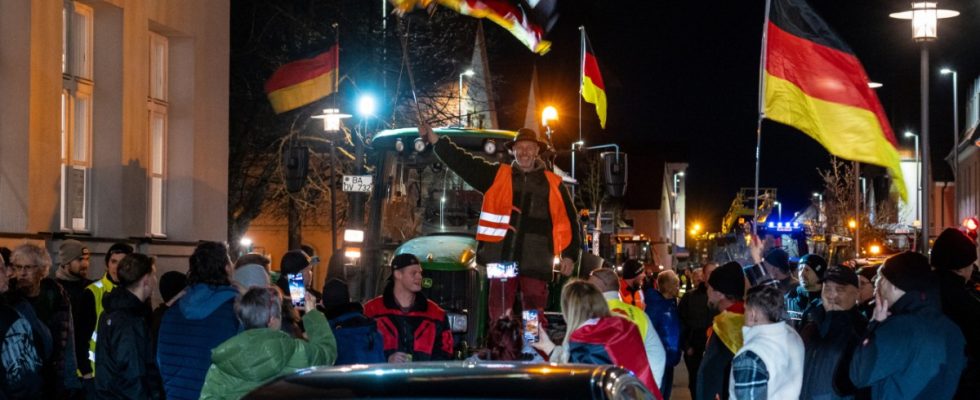The Bavarian state government defends itself against the Green Party federal chairwoman Ricarda Lang’s accusation that she was too hesitant and half-hearted in advocating for her party’s right to assemble. State Chancellery Minister Florian Herrmann (CSU) spoke of “legend-knitting” after the cabinet on Tuesday. The fact is that all demonstrations and gatherings in Bavaria are protected “in a comprehensive manner” by the police. This applies to both attendance and agreements in advance of events, for example with district offices. In the event of disruptions, the authorities took decisive action; this was “complete consensus”. But it starts with the creation of “legends” and a “narrative,” says Herrmann, when one equates legitimate criticism of the Greens’ positions with the restriction of their freedom of assembly.
The Green Party leader had previously complained that Prime Minister Markus Söder (CSU) had still not recognized the seriousness of the situation when it came to the threat to green events. Incidents with protesting farmers and other demonstrators have recently occurred many times in Germany, including at a Green district meeting in Hirschaid near Bamberg. The Bamberg Green District Association spoke of a “gauntlet” of insults, the situation was perceived as very dangerous and the police were not sufficiently present.
It’s not about different attitudes to green politics, said Lang, but about the fact that attacks on people are “a problem for our entire democracy.” She doesn’t expect Söder to be friendly towards her party, but “that we can rely on him to defend the foundations of democracy together with us.”
State Chancellery Head Herrmann commented on Lang’s statements when asked by the press. The Green leader’s “politically driven view” is “counteracted” by information from her own party, he said. The Green Federal Economics Minister Robert Habeck recently “spontaneously thanked him for the excellent police work” during meetings in Bavaria; Habeck felt well looked after and accompanied.
Ricarda Lang also referred to a television appearance by Markus Söder the day before. “Everyone who is threatened will be absolutely protected,” said the Prime Minister on the ARD program “Caren Miosga”. But the Greens should consider what contribution they themselves made to causing so much rejection among the population. There is no reason to change the tone and choice of words towards the Greens, said Söder, and by this he also meant criticism of some passages in his speech on political Ash Wednesday this year. He doesn’t want a “linguistic moral code” with guidelines as to how strongly the Greens can be attacked.
CSU General Secretary Martin Huber argued similarly. “It is downright absurd to now give the impression that the CSU’s more than justified criticism is to blame for the mood,” the state parliament member told journalists in Munich on Monday. “It is the bad traffic light policy that is to blame for the bad mood.” Huber accused the Greens of practicing a “victim cult.” The party itself has been “pushing the boundaries of protest” for years, following the motto that the end justifies the means. Huber cited the Castor transports, the Lützerath opencast mine in North Rhine-Westphalia and the “climate adhesive” as examples.
Bavaria is demanding less VAT in the catering industry, including for drinks
On Tuesday, the Bavarian cabinet focused on finance and the economy. Finance Minister Albert Füracker (CSU) expressed his joy that the Free State had just received the top rating for creditworthiness from an international rating agency. His house had already announced this at the weekend. They were “rewarded” for the high investment rate, which is also reflected in the double budget that was recently introduced into the state parliament for the first time; also for low debt and an economically stable environment. According to Füracker, there is a crisis everywhere at the moment, but one can see that political decisions are definitely important.
On Tuesday, the Council of Ministers approved a Federal Council initiative with ideas for a tax and economic policy “Agenda 2030” – especially with the call for significant tax cuts for companies. The already decided deletion of tax relief for agricultural diesel for farmers is to be revised, and the reduced VAT rate is to apply again in the catering industry; and in the future also for drinks, not just for food. The electricity tax should be reduced to the European minimum and the exit from nuclear energy should be re-examined.
Economics Minister Hubert Aiwanger (FW) said that there was “still marginal economic growth in Bavaria, while the federal government is shrinking”. The federal government must “finally recognize that the hut is on fire.” The traffic light lacks the courage to create room for maneuver in order to become competitive again.

